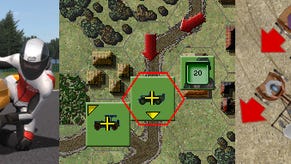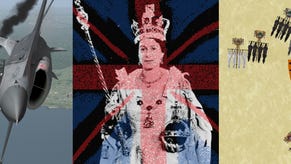The Bestest Best Racing Game Of 2014: Qvadriga
Wheels Of Fury
In what other racing game might your three horsepower engine collapse from over-zealous whipping? Qvadriga is a historical chariot simulator that spins stories of bloody rivalries and daring comebacks alongside its quickly spinning wheels, and that's why we love it.
Adam: Of course our favourite racing game of the year is turn-based. Of COURSE it is.
When I wrote about Qvadriga's tactical brilliance earlier this year, plenty of people showed up to give me a history lesson. They weren't correcting any of several possible inept statements about the history of the sport, they were informing me of the long history of both turn-based racing games and, specifically, chariot racing games.
Qvadriga has certainly drawn inspiration from the world of boardgames. The rules and inputs are simple, the images are immediately legible, and the campaign that frames the action seems simple enough to track on paper and card. Over time, the unexpected complexities of that campaign have convinced me that the game is not only one of 2014's best, but one of the finest sports management games ever made. And you don't even have to like an actual proper sport to get the most out of it!
It's a brutal game. The activity that it translates into turn-based top-down tracktical jostling often led to fatalities, both equine and human. Your charioteers will die and they will kill, sometimes by the lashing of a whip and sometimes by the thundering, bone-crunching wheels of a chariot.
Occasionally they are dragged behind their own vehicles, face-down in the dirt and dust, until all the flesh is torn from their bones.
Qvadriga is a violent game and even though its graphics take a distant view of the action, presenting it as a beautifully clean affair that emphasises the brilliance of the track-top UI, I wince whenever a pained whinny escapes my horses. The decisions within a race are fraught with peril and tension, capturing the glory of triumph and the anguish of defeat. Even the speed at which movements play out when choices have been made seems perfectly timed in retrospect - I thought it too slow at first - allowing the eye to scan every lane, and each possibility to hang suspended in the air for a moment.
If the races weren't depicted so elegantly, the campaign would scarcely matter, but with the action in the arena as a foundation, Qvadriga builds upwards. What seems like a simple ranking and unlock system actually includes a dynamic series of in-race objectives. The thing is, the game doesn't necessarily direct you as to what your objectives are - you'll have to figure that out for yourself.
After a few races, it becomes clear that the path to ultimate victory doesn't involve trying to come in first place every time. Occasionally, it'll be better to send in a shabby team with the objective of taking out a specific opponent who is dominating rankings. Kill them and everyone has a clearer route to the top.
Sometimes a race will be too hazardous to risk everything in so the smart manager will send a solid, tough crew - slower, but with a good chance of coming through unscathed. Occasionally, a race will seem like a must-win affair but mid-way through, something unexpected will happen and everything will change.
Even though the variety of arenas is understandably limited, the range of possibilities and the number of variables is enormous. An injury can disrupt short-term planning - a death can disrupt everything.
As a sports management sim, Qvadriga is at the opposite end of the spectrum to Football Manager. It favours simplicity in its stats and the options permitted, but makes every single action meaningful. From the lash of a whip to the purchase of fresh horses, everything has a strong and immediate effect, and while the simulation of the world is comparatively simple, it is a place in which I'm glad to live and die.
Graham: I like your rubber-and-petrol racing games well enough, but as I slide off at a corner and find myself at the back of the pack, a mental finger flicks across to the restart button. Maybe I'll press it and start the race afresh with a new opportunity not to screw up, or maybe I'll decide to play the course out and get the extra practice. But the thought is always there: should I just wipe the slate clean?
That thought never crosses my mind when I play Qvadriga. Instead every bleeding rider, fallen horse or wayward chariot only stokes my desire to push on and keep playing. That's in part because its turn-based tactics mean that failure is granular - you are never simply behind with no way to catch up, but instead always in a limping fight for survival. It's also in part because Qvadriga is the FTL of racing games - your drivers and your horses can die, and you can name the former after your friends.
That means that it's a great game for creating anecdotes. That time Alec whipped his horses to death and was left slowly trundling into last place. That time John's chariot was rammed to pieces, but he gripped the reigns and let his horses drag his searing body over the finish line. That time a similarly chariot-less Adam made a break for the outer wall, to escape and live and race another day, only to find himself trampled under the stomping hooves of a trailing competitor.
The real, still-living Adam is right: this is a sports management you don't need to like sports in order to enjoy. But I love it because it's a turn-based strategy game you need only five minutes to learn how to play, and another fifteen in order to have had a valuable little anecdote to remember. You won't ever want to wipe the slate clean again.
Want to read more about Qvadriga? Here's Adam's Qvadriga review and Tim's after action report.
Back to the complete bestest best PC games of 2014.









